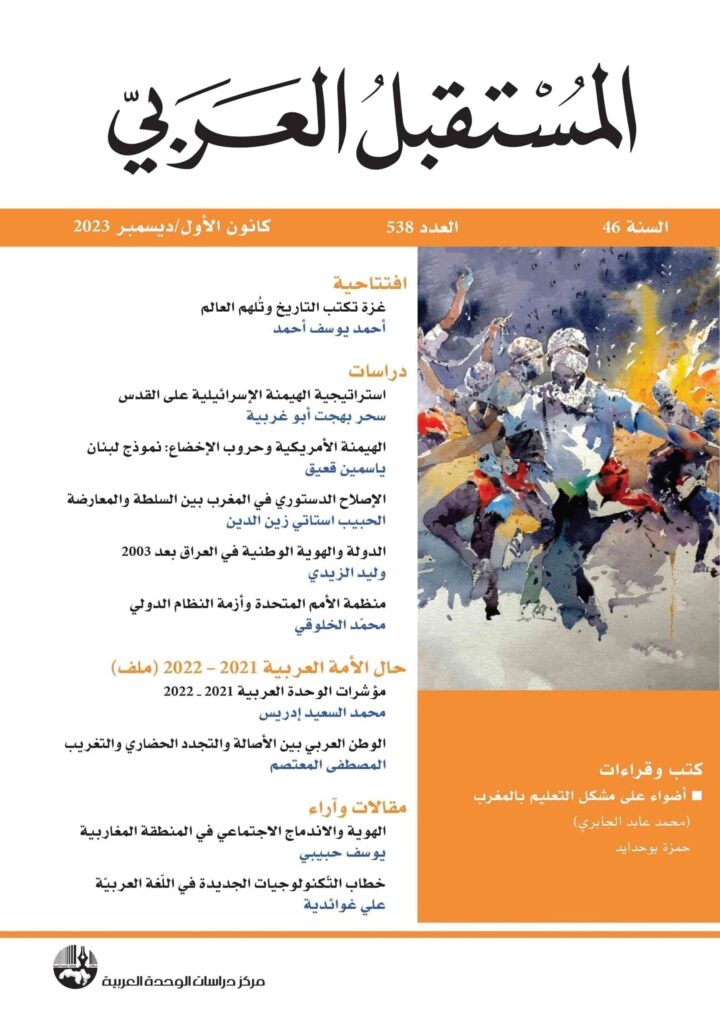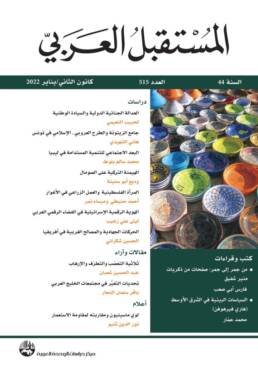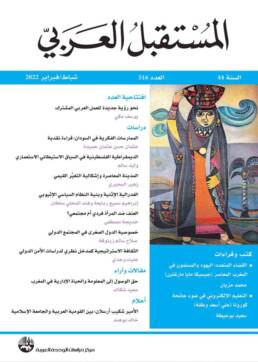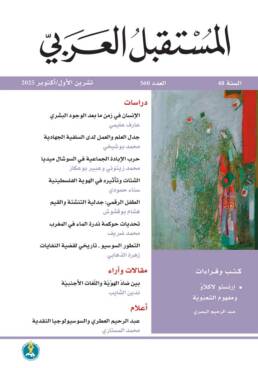Editorial
Gaza writes history and inspires the world……… Ahmad Youssef Ahmad 7
Studies
The Israeli strategy to maintain control
over Jerusalem…………………………………………………… Sahar Bhagat 13
Since its occupation of the eastern part of Jerusalem in 1967, the Zionist authorities have pursued strategies to impose geographical, demographical, intellectual and ideological hegemony over the city of Jerusalem and its Palestinian residents. The last of these plans was the plan to “Reduce Social and Economic Disparities and Economic Development in East Jerusalem”, or the so-called five-year plan which seeks to consolidate Israeli sovereignty over the city and tighten control over the land. This research aims to examine the five-year plan, its provisions, objectives, motives, results, and its impact on the reality of the city of Jerusalem and its future from geographical, demographical, intellectual-cultural aspects, providing a futuristic vision to the extent of which the plan can be implemented and its objectives achieved.
Keywords: Jerusalem, Five-year plan, Israeli hegemony.
American hegemony and wars of subjugation:
the Lebanon model…………………………………………… Yasmine Qaqiq 28
In a legal-political study that represents a solid foundation in the field of studies in international monetary and financial law, researcher Ahmed Suwaidan sheds light on how international and foreign financial procedures comply with international financial law, and the reasons that require financial institutions in a country to comply with the financial laws and procedures adopted by another country, and what may result from non-compliance. This study examines the origin, form, legal force and repercussions of US financial measures, and the repercussions of non-compliance, and how these measures were adopted in the Lebanese case, whether as national measures or international measures.
Keywords: Financial Wars, American Hegemony, Money Laundering, Lebanon, Lebanese banks.
Constitutional reform in Morocco amidst the strategies
of political authorityand the unconventional
opposition………………………………………. Al-Habib Stati Zein Al-Din 51
This paper examines the extent to which the “wishes produced” by the constitution are consistent with the practices of democratic transformation in Morocco after more than ten years of its entry into force. The study is based on the hypothesis that this supreme law bears the seeds of developing political life and qualifying actors even before its implementation, but only practice helps activate its perspective for managing power and ensuring rights and freedoms. Although the link between the constitution and its context does not appeal to some constitutional jurists, the paper argues that attributing the 2011 constitutional reform to a specific party rather than another involves a narrow perception, and attention must be paid to the inconsistency of its arguments.
Keywords: Constitutional Reform, Political Authority, Non-traditional Opposition, Democracy, Practice.
Challenges facing the state and national identity
in Iraq after 2003……………………………………………… Walid Al-Zaidi 72
Despite the establishment of a “modern state” in Iraq since 1921, under a monarchy and later under a republican rule, this state did not succeed in integrating the ethnic, religious, sectarian and tribal social components into a single melting pot of citizenship governed by the Iraqi national identity. Rather, the inherited traditionalist components remained present in the administration of the Iraqi state and its social formations for decades. This legacy quickly emerged strongly after the American invasion of Iraq in 2003, and the constitution, system of government, and political forces that emerged from this invasion were dominated by religious, sectarian, ethnic, and tribal polarization, and the dominance of sectarian interests and loyalties over the public interest and national identity.
Keywords: Iraq, National Identity, Sectarian Loyalties, Corruption, The Deep State, Waste of Public Money, American Occupation.
The United Nations and the International
System dilemma………………………………….. Muhammad Al-Khalouki 94
The establishment of the United Nations was accompanied by differences in views between the major founding countries, even though they were victorious countries in World War II, especially between the United States of America, Britain, the Soviet Union, and less powerful allies such as France and China. A dispute centered around the authorities of the organizational bodies, and how to ensure world peace. It therefore suffers from two major problems: the first has an objective dimension related to new threats on the international scene, which requires reconsidering the traditional concept of international peace and security, and the second has a structural dimension related to the five permanent members of the Security Council and the inability of the organization and its charter to manage conflicts of which one of those members is a participant in.
Keywords: United Nations, Security Council, International System, International Peace and Security.
State of the Arab Nation 2021 – 2022 (File 1)
Arab Unity: A comparative reading between the indicators
of 2021 and 2022………………………………. Muhammad Al-Saeed Idris 110
The paper presents a comparative analysis of three indicators of the state of Arab unity between 2021 and 2022, based on the fact that Arab unity is a cumulative process in awareness and in practical reality, and therefore its achievement requires popular and democratic struggle. The first indicator is the Arab national state, meaning the extent of the state’s cohesion in the face of threats, disintegration and fragmentation. The second indicator is Arab-Arab relations, whether Arab countries are cooperative or vice versa. The third indicator is to measure the effectiveness of the Arab system by studying the performance of the League of Arab States, specifically the summit conferences and the decisions and recommendations issued by them.
Keywords: Arabunity, national state, Arab-Arab relations, Arab system.
The Arab world between genuineness, cultural renewal, and Westernization:
givens and challenges 2021 – 2022…………… Al-Mustafa Al-Mu’tasim 124
The question of “civilizational renewal” is being raised today in the face of economic and social challenges and crises, environmental problems and the failure of development plans, and in the context of accelerating global geostrategic transformations and a global climate characterized by conflict. But it seems that the Arab countries have not decided what role they can play in the future in light of the global order that would come to be after the end of war in Ukraine. Will they remain subjugated countries, plundered of goods, a consumer market, a laboratory for destructive chaos, subject to dismantling projects, and a field for the struggle of major global powers? Or will the Arabs gain a means to unleash the dynamics of progress and renewal in their social and cultural development in a way that qualifies them to catch up with other contemporary nations?
Keywords: Genuineness, Civilizational renewal, Westernization, World order.
Articles and opinions
Identity fragmentation and social integration dilemma
in the Maghreb region………………………………………. Youssef Habibi 139
New discourse technologies in the Arabic language: the curse of decadence
and the horizon of derivation……………………………….. Ali Ghawidiya 147
Books and Readings
Highlights on the problematics of education in Morocco
(Mohamed Abed Al-Jabri)………………………………. Hamza Bouhdayid 156
Books Summaries……………………………………………………………….. 160
Arabic Books: Rhythms on the String of Consciousness; Criticism of the suicidal Salafist and isolationist sectarian discourses; Social Movements and Political Parties: Political Islam in Egypt, Tunisia, and Morocco; Securitization of Islam in Europe: Deconstructing identity and building security.
Foreign Books: The Damascus Seat of Power: Syria’s Heads of State, 1918-1946; War, Technology and the State; The Arab Nahda as Popular Entertainment: Mass Culture and Modernity in the Middle East.
Research Reports: Meeting Low Expectations: Analyzing President Biden’s Summit with Chinese President Xi Jinping; Iran Potentially Expanding Its Air Defense Axis in Lebanon and Syria.
Add a review
You must be logged in to post a review.








